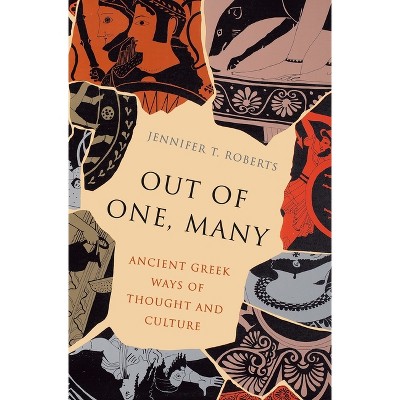Sponsored

The Beginnings of Philosophy in Greece - by Maria Michela Sassi (Paperback)
In Stock
Sponsored
About this item
Highlights
- An acclaimed study of the diverse origins of ancient Greek philosophy In this acclaimed book, Maria Michela Sassi reconstructs the intellectual world of the early Greek "Presocratics" to provide a richer understanding of the roots of what used to be called "the Greek miracle.
- About the Author: Maria Michela Sassi teaches the history of ancient philosophy at the University of Pisa.
- 232 Pages
- Philosophy, History & Surveys
Description
About the Book
"Originally published as Gli inizi della filosofia in Grecia, copyright Ã2009 by Bollati Boringhieri"--Copyright page.Book Synopsis
An acclaimed study of the diverse origins of ancient Greek philosophy
In this acclaimed book, Maria Michela Sassi reconstructs the intellectual world of the early Greek "Presocratics" to provide a richer understanding of the roots of what used to be called "the Greek miracle." This unique study explores the full range of early Greek thinkers in the context of their worlds--from the Milesian natural thinkers, the rhapsode Xenophanes, and the mathematician and "shaman" Pythagoras, to the inspired Parmenides, the oracular Heraclitus, and the naturalist and seer Empedocles.From the Back Cover
"This book is among the most illuminating contributions to the much-debated topic of how, why, and in what form the Greeks of the sixth and fifth centuries BC created philosophy. Its constructive blend of cultural history, anthropology, and philosophical analysis makes it particularly good to think with, and it is now finally available to a broader audience of Anglophone readers."David Sedley, University of Cambridge
"This impressively learned book contributes to longstanding debates about the beginnings of Greek philosophy, its connections to earlier Greek writings that address similar topics, the way Aristotle shapes our access to Presocratic philosophy, and more."Katja Maria Vogt, Columbia University
"Avoiding the main pitfalls that beset her subject, Sassi looks afresh at the evidence for important early Greek thinkers, asks what can be attributed to them, and admirably allows for a great variety of responses to that question."Geoffrey Lloyd, Needham Research Institute
Review Quotes
"This book is among the most illuminating contributions to the much-debated topic of how, why, and in what form the Greeks of the sixth and fifth centuries BC created philosophy. Its constructive blend of cultural history, anthropology, and philosophical analysis makes it particularly good to think with, and it is now finally available to a broader audience of Anglophone readers."--David Sedley, University of Cambridge
"This impressively learned book contributes to longstanding debates about the beginnings of Greek philosophy, its connections to earlier Greek writings that address similar topics, the way Aristotle shapes our access to Presocratic philosophy, and more."--Katja Maria Vogt, Columbia University
"This elegant study shows how a variety of historical, social, and cultural questions and factors eventually led to the formation of a new discipline called 'philosophy' in ancient Greece. Sassi displays an admirable blend of anthropological and philosophical sensitivity that is perfectly adapted to the subject and illuminates it in many new ways."--André Laks, author of The Concept of Presocratic Philosophy
"[A] rich investigation of the origins of philosophical thought in Greek culture."---Peter Adamson, New York Review of Books
"Readers will come away with a much more nuanced understanding of the origins of philosophy in Greece and the many contributing factors."---David Lorimer, Paradigm Explorer
"Avoiding the main pitfalls that beset her subject, Sassi looks afresh at the evidence for important early Greek thinkers, asks what can be attributed to them, and admirably allows for a great variety of responses to that question."--Geoffrey Lloyd, Needham Research Institute
About the Author
Maria Michela Sassi teaches the history of ancient philosophy at the University of Pisa. Her books include The Science of Man in Ancient Greece.










